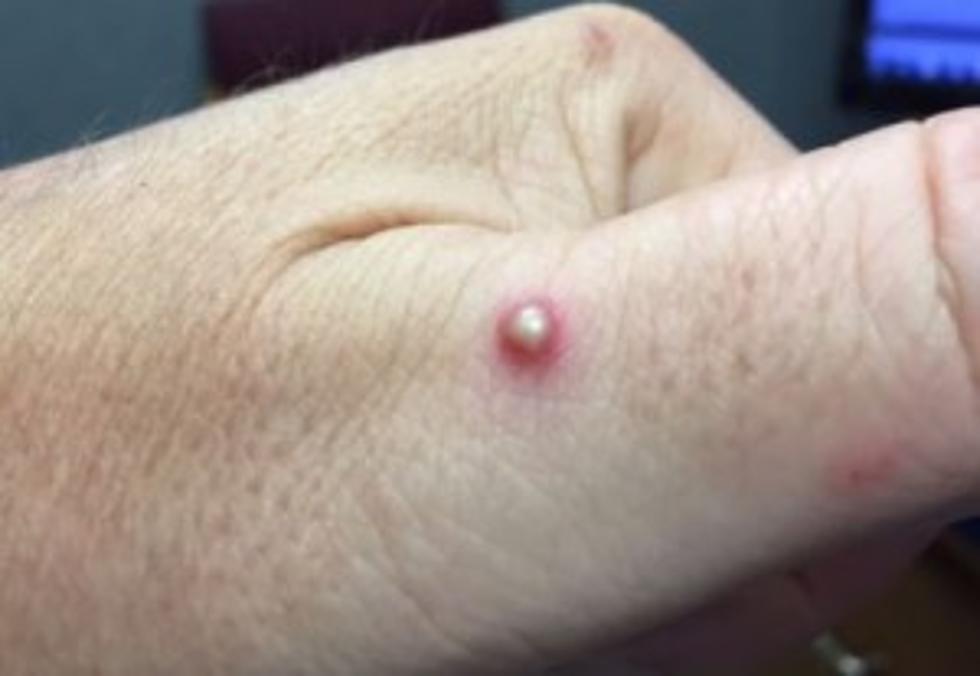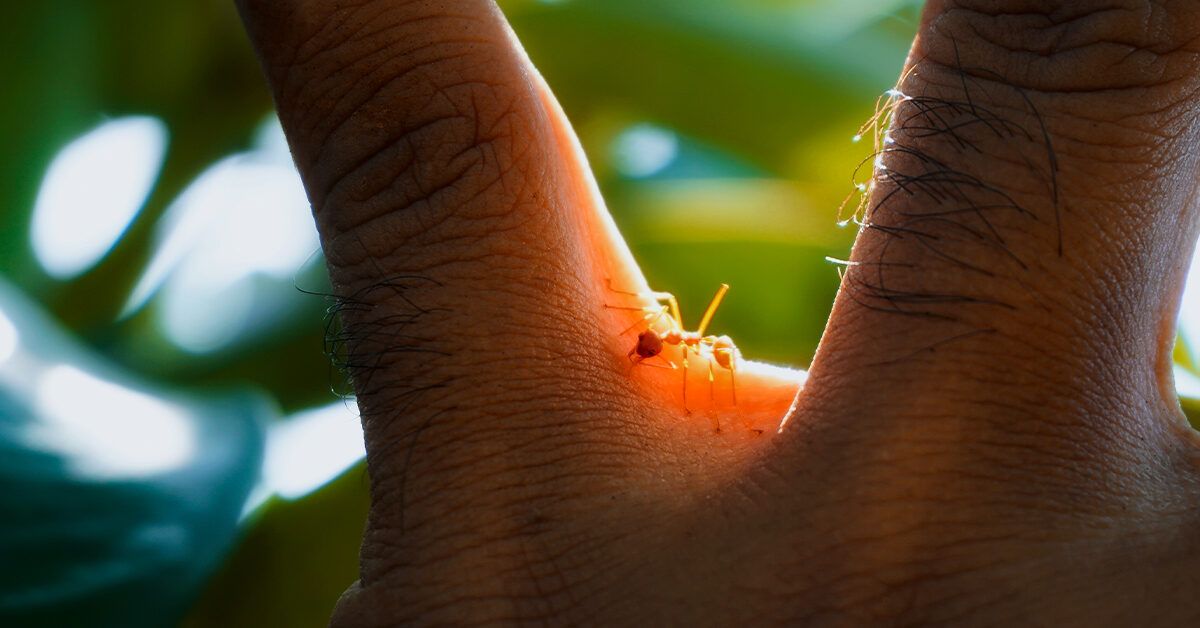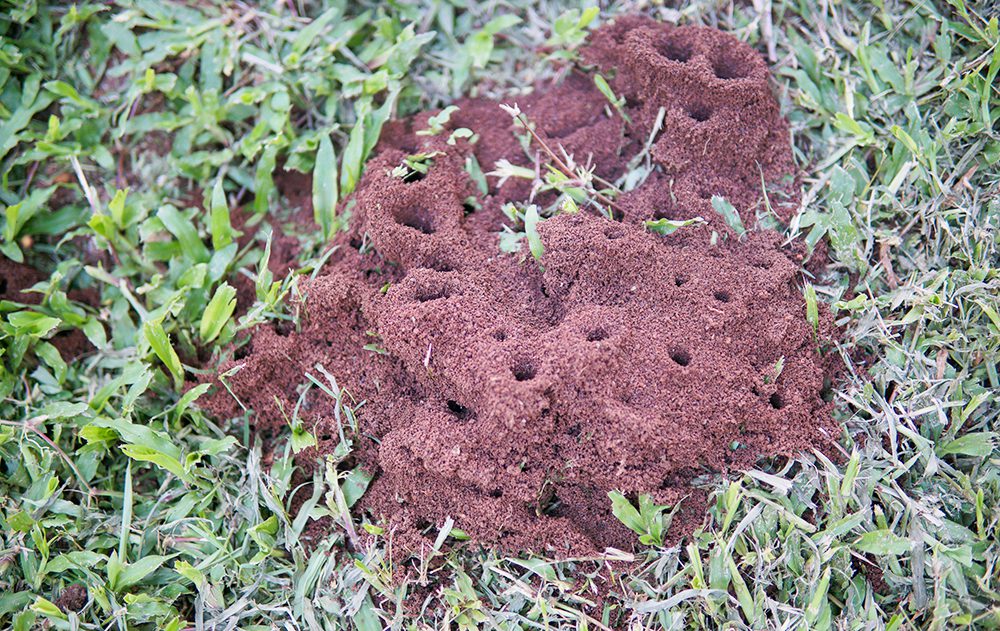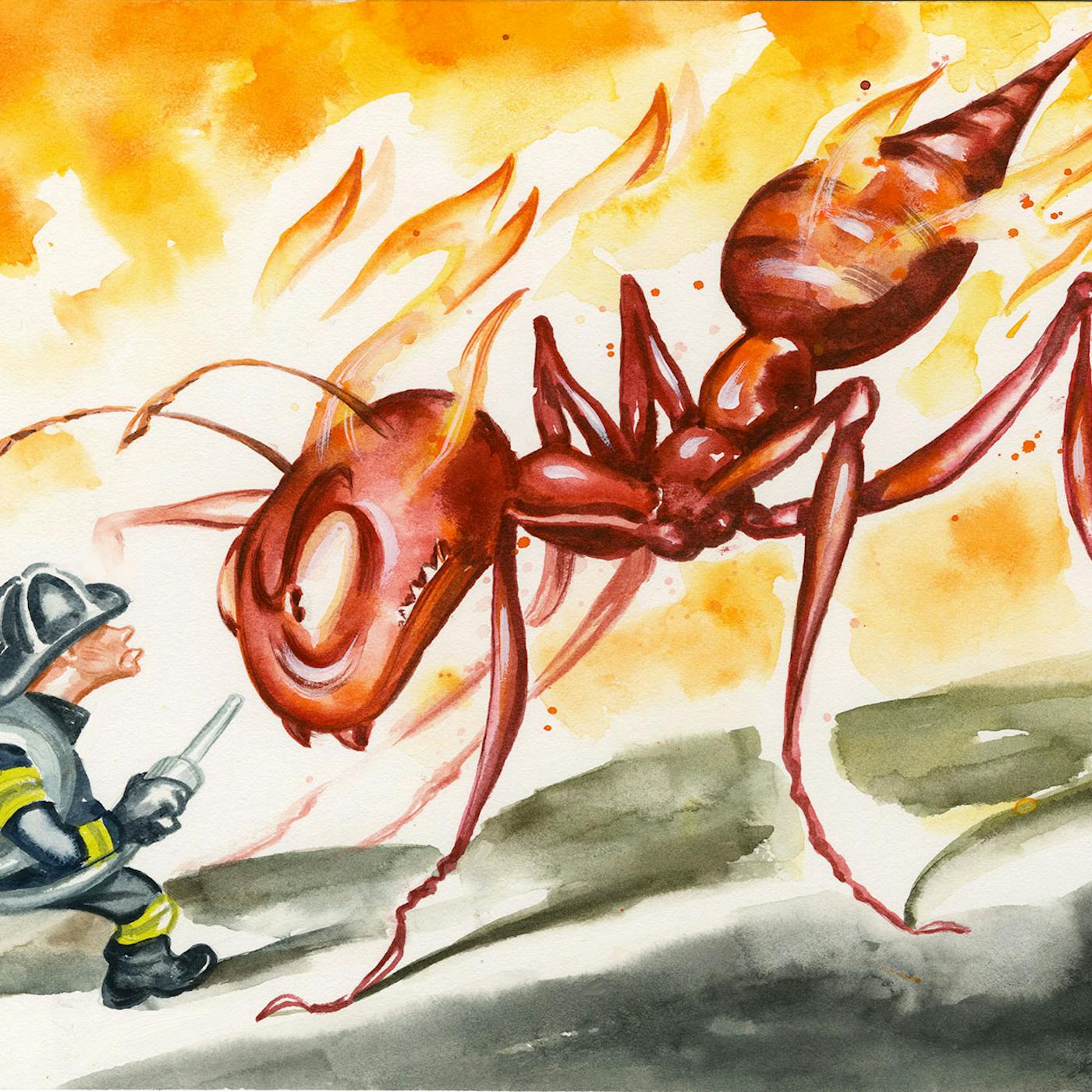No, you should not pop red ant bites. Popping them can lead to infection.
Red ant bites can be extremely irritating, especially considering the fiery sensation that often accompanies the initial sting. These bites typically result in a raised red area, which might develop into a blister. Succumbing to the urge to pop this blister is a mistake many might consider, but it should be avoided.
Puncturing the bite can introduce bacteria to the wound and potentially lead to an infection or a scar. It’s far better to treat red ant bites with remedies that reduce itching and inflammation, such as applying a cold compress, using topical antihistamines, or taking oral antihistamines for more severe reactions. Remember to keep the area clean and resist any temptation to scratch or pop the blister, ensuring a faster and safer healing process.
The Red Ant Menace
Stumbling upon a red ant mound can be a painful experience. Known for their aggressive nature and fiery sting, red ants are small insects with a big punch. Their bites can lead to discomfort, swelling, and an irresistible urge to scratch. So, what should you do if you find yourself the target of these little warriors? Let’s unpack the mystery behind red ant bites and learn the best course of action to minimize their impact.
Species With A Nasty Sting
Not all ants are created equal. Some species pack a more formidable sting compared to others. The most notorious of these is the fire ant, known scientifically as Solenopsis invicta. This tiny creature’s bite injects a potent venom that is not easily forgotten. Recognizable by their reddish-brown color and mound-shaped nests, fire ants are an adversary best avoided.
- Fire Ant (Solenopsis invicta)
- Red Harvester Ant (Pogonomyrmex barbatus)
- Southern Fire Ant (Solenopsis xyloni)
Common Reactions To Bites
Red ant bites lead to a variety of reactions. Common symptoms include:
| Symptom | Details |
|---|---|
| Redness | Area around the bite turns red |
| Swelling | Bite swells into a small bump |
| Pain | Sharp, burning sensation |
| Itching | Intense urge to scratch |
While the urge to pop a red ant bite might be strong, resisting is crucial. Popping can lead to infection and scars. Instead, clean the area with soap and water. Apply a cold compress to reduce swelling. If needed, use topical treatments like hydrocortisone cream for relief. Seek medical help if there’s difficulty breathing or severe swelling.

Credit: 973thedawg.com
Immediate Responses To Red Ant Bites
Got bitten by a red ant? Your skin might sting, swell, or turn red. Quick action can ease these troubles. Here’s what you should do when red ants bite.
First Aid Steps
Do not pop red ant bites. It might worsen the situation. Instead, follow these first aid steps:
- Clean the area – Use soap and water.
- Apply ice – Wrap in cloth and place over bite for relief.
- Use creams – Calamine lotion or hydrocortisone eases the itch.
- Try not to scratch – This helps prevent infection.
Identifying Signs Of Allergic Reactions
Some people have strong responses to ant bites. Know these signs:
| Signs of Mild Allergic Reactions | Signs of Severe Allergic Reactions |
|---|---|
| Redness | Difficulty breathing |
| Hives | Swelling of face or throat |
| Itchiness | Dizziness or faintness |
| Minor swelling | A rapid pulse |
| Get medical help fast for these signs. |
To Pop Or Not To Pop
To Pop or Not to Pop, that’s the question many muster when facing the red, itchy aftermath of an ant bite. Itching for relief, one might consider popping the bite as a quick fix. But before you act, it’s important to understand the risks and why healthcare professionals advise against it.
Risks Of Popping Ant Bites
Popping an ant bite might seem harmless, but it can lead to unwanted complications:
- Infection: Bacteria from your hands and nails can enter the open wound.
- Scarring: Disrupting the skin’s healing process can leave permanent marks.
- Worsened Swelling: Popping can cause further inflammation and discomfort.
Why Popping Isn’t Recommended
Health experts advise against popping ant bites for several reasons:
- The body naturally heals these bites and popping can interrupt this process.
- Keeping the site clean and intact reduces the chances of complications.
- Topical treatments and cold compresses offer safer relief options.
Resist the urge to pop and choose safer, more effective healing methods. Your skin and health will thank you!

Credit: www.healthline.com
Proper Care For Ant Bites
Proper Care for Ant Bites starts immediately after you get bit. Red ant bites can be painful and itchy. You may get a strong urge to pop them, but you should not pop ant bites. Popping can cause infection and slow down the healing process. Instead, take care of the bite area and manage symptoms.
Home Remedies For Relief
For quick relief from ant bites, turn to your kitchen and medicine cabinet. Here are some effective treatments:
- Cold compress: Reduces swelling and eases pain.
- Aloe vera: Soothes the skin and provides cooling relief.
- Honey: Offers natural antibacterial properties.
- Baking soda paste: Relieves itching and reduces redness.
Apply these remedies gently to the affected area. Always clean the bite first with soap and water.
When To Seek Medical Attention
Sometimes, ant bites cause severe reactions. Here’s when you should see a doctor:
| Signs | Action |
|---|---|
| Difficulty breathing | Seek emergency care |
| Swelling of face, lips, or tongue | Consult a doctor immediately |
| Dizziness or faintness | Get medical help fast |
| Rash spread or fever | Visit your healthcare provider |
Note: Some people are allergic to ant bites. Allergic reactions need urgent care.
Preventive Measures And Tips
Red ant bites can be itchy and uncomfortable. It’s tempting to pop them, but that can lead to infection. Instead, taking preventive steps to avoid bites is key. Let’s explore how to keep those pesky ants at bay.
Avoidance Strategies
Staying clear of ant bites starts with smart avoidance. Here are simple steps to keep in mind:
- Watch your step: Look where you walk, especially near ant hills.
- Secure your home: Seal cracks and crevices to prevent indoor invasions.
- Protect your skin: Wear long sleeves and pants in ant-prone areas.
- Keep food covered: Open food attracts ants, so store it properly.
- Stay vigilant: Regularly check your surroundings for ant activity.
Natural And Chemical Repellents
Repellents are crucial for keeping ants away. Here’s a breakdown of natural and chemical options:
| Natural Repellents | Chemical Repellents |
|---|---|
|
|
Whether you choose natural or chemical repellents, always follow safety instructions.

Credit: www.conwaymedicalcenter.com
Long-term Effects And Scarring
Ant bites might seem small, but they can have lasting effects. Red ant bites, in particular, can lead to long-term skin changes. It’s important to know the do’s and don’ts for dealing with them. This includes understanding the potential for scarring and exploring the various treatment options for bite marks. Let’s dive deeper into these topics to ensure your skin remains as healthy and clear as possible.
Potential For Scarring
Scratching or popping red ant bites can increase the risk of scars. The intense itchiness may tempt you to scratch, but doing so can damage the skin. This can lead to infection and ultimately, permanent scarring. Red ant bites can also cause hyperpigmentation, where the bite area becomes darker than the surrounding skin. To prevent these outcomes, it’s crucial to resist the urge to scratch or pop these bites.
Treatment Options For Bite Marks
Treating red ant bite marks involves reducing inflammation, avoiding infection, and promoting healing. Here is a list of measures to take:
- Use a cold compress to reduce swelling.
- Apply antihistamine cream to relieve itching.
- Keep the area clean to prevent infection.
- Aloe vera gel can soothe the skin and help healing.
For existing scars, medicated creams and silicone gel sheets can improve appearance. In some cases, professional treatments like laser therapy may be an option. Consult with a dermatologist for the best course of action for your specific situation.
Frequently Asked Questions Of Are You Supposed To Pop Red Ant Bites
What Happens If You Pop A Red Ant Bite?
Popping a red ant bite can lead to infection and possibly a scar. Always keep the area clean and avoid scratching to reduce the chance of further complications.
Is It Better To Pop Ant Bites Or Leave Them Alone?
Leave ant bites alone to reduce infection risk; popping them can cause complications. Treating with antiseptic is a safer option.
Should I Drain An Ant Bite?
No, do not drain an ant bite. Gently clean the area with soap and water and apply a cold compress to reduce swelling and itching.
Why Do Red Ant Bites Turn Into Pimples?
Red ant bites often cause pimples due to the body’s inflammatory reaction to their venom, which contains irritants and allergens.
Conclusion
To sum it up, resist the urge to pop red ant bites. Treating the area with proper care prevents infection and scarring. Consult your doctor if symptoms intensify. Remember: prompt and appropriate action is key to recovery. Keep these bites clean and monitor for allergic reactions.
Stay safe and informed on bite care.

I’m MD Tanvir, and I bring years of expertise gained from working closely with pest control companies to the forefront. My journey in the industry has inspired me to launch Bug Battler, a platform aimed at equipping people with the know-how to combat pests autonomously. Through Bug Battler, I aim to empower individuals with practical insights to tackle pest infestations effectively.

